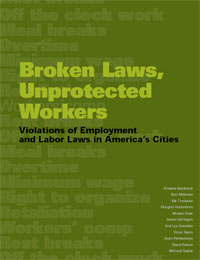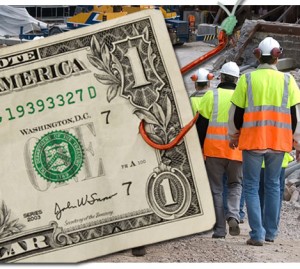STATE GOVERNMENT
Washington coalition seeks solutions to address wage theft
(Oct. 25, 2012) — The decline of economic security for American working families is not just due to recession-related joblessness. Many workers are also victims of what is now commonly known as “wage theft,” and a coalition of labor, human-rights and faith-based groups is organizing to raise awareness about the problem and the need for solutions.
 Wage theft, or the illegal under-payment or non-payment of wages, affects tens of thousands of workers across Washington state and millions more across the country. “Broken Laws, Unprotected Workers,” a comprehensive national study of three large U.S. cities, has documented shocking levels of wage theft:
Wage theft, or the illegal under-payment or non-payment of wages, affects tens of thousands of workers across Washington state and millions more across the country. “Broken Laws, Unprotected Workers,” a comprehensive national study of three large U.S. cities, has documented shocking levels of wage theft:
- 64% of low-wage workers experience wage theft each week;
- 26% are paid under the legal minimum wage;
- 76% of workers owed overtime go unpaid or underpaid; and
- On average, low-wage workers lose $51 per week to wage theft, or $2,634 per year. For low-wage workers, that amounts to 15% of their annual income, at average earnings of $17,616 per year.
Wage theft can push a family into the crushing cycle of debt; losing a single paycheck can make all the difference in the world to a low-wage worker. It can cause debilitating financial and personal burdens, such as home eviction, utility shutoff, and car repossession.
But low–wage workers aren’t the only ones experiencing wage theft. Middle-income earners are experiencing high violation rates in industries such as construction, manufacturing and services.
This video by the Interfaith Worker Justice explains the types of wage theft that commonly occur and the need for a national conversation about what can be done to stop it.
Workers deserve access to justice, but wage-theft violations often go unreported and unchallenged. Washington state’s laws give workers little opportunity to press claims, little protection from retaliation, and little financial benefit — even when workers prevail. Workers who cannot afford to be fired or have their hours cut simply stay silent. If they have the courage to report a violation, overburdened state enforcement agencies make it virtually impossible to recover lost wages.
 Wage theft also has a significant impact on state revenues, with billions of dollars lost in tax and payroll fraud. In New York alone, an estimated $427 million in state revenue is lost per year due to wage theft. And unfortunately, recession-generated state budget cuts have led to declining enforcement capacity, making it easier to violate wage-and-hour laws with impunity.
Wage theft also has a significant impact on state revenues, with billions of dollars lost in tax and payroll fraud. In New York alone, an estimated $427 million in state revenue is lost per year due to wage theft. And unfortunately, recession-generated state budget cuts have led to declining enforcement capacity, making it easier to violate wage-and-hour laws with impunity.
What can be done about it?
The Stop Wage Theft Coalition is working to develop solutions that make sense for Washington. There are various examples in other states where strengthening laws against unscrupulous employers allowed workers to recover billions of dollars in stolen wages, and gave states the ability to recoup hundreds of millions in lost revenue. Some of that revenue from wage theft penalties can be dedicated to support enforcement programs.
“Washington needs to crack down on wage theft and strengthen laws against unscrupulous employers,” said Teresa Mosqueda, Legislative and Policy Director for the Washington State Labor Council, who participates in the coalition. “We need to bolster enforcement so efforts match the scale of the problem. Government agencies must have the resources to become effective enforcers of the law.”
In addition, the 21st-century economy has seen a rapid rise in the number of employers who try to shirk their responsibilities by claiming that their employees are sub-contractors. The misclassification of employees as “independent contractors” is pervasive, particularly in industries that often employ low-wage, vulnerable workers.
“The Stop Wage Theft Coalition supports the use of legitimate independent contractors, who play an important role in our economy,” Mosqueda said. “Nevertheless, employers must comply with their legal responsibilities to properly classify and compensate their workers to ensure a level playing field for all businesses and employers that abide by the rules.”
For more information about the Stop Wage Theft Coalition or to get involved, email Teresa Mosqueda or call her at 206-353-5276.





